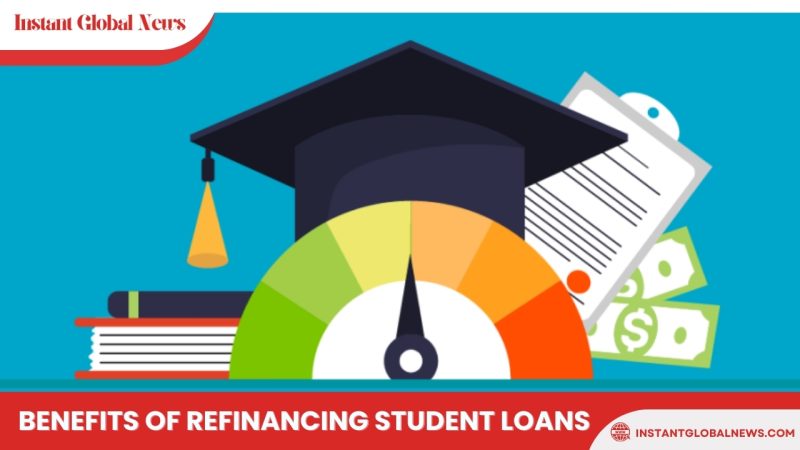Refinancing student loans can be an attractive option for individuals burdened by high monthly payments and interest rates. The idea of combining multiple loans into a single loan with lower interest rates may offer significant savings. However, before jumping into the decision to refinance, it’s important to understand the potential advantages and drawbacks to make an informed choice.
Top 5 Considerations to Make Before Refinancing Student Loans
To avoid accruing more debt in the long run, it is crucial to examine your entire financial portfolio, compare lenders, and consider the pros and cons of refinancing student loans. By doing so, you can ensure that your decision aligns with your financial goals.
Pro: You Can Save Money with a Lower Interest Rate
Saving money is often a primary goal when refinancing student loans. To achieve this, it is essential to secure a new private loan with a lower interest rate than your original loans. A lower rate not only decreases the amount of interest you pay over the loan’s lifespan but also reduces the likelihood of interest capitalization, where unpaid interest accumulates and adds to the principal balance. To find the loan with the best rate, it is vital to shop around and compare lenders through prequalification, while minimizing the impact to your credit score.
Pro: A Longer Repayment Period Can Lower Your Monthly Payment
Opting for a longer repayment duration for your student loans can lead to significant advantages, such as reduced monthly payments. This can ease your immediate financial burden and simplify your monthly financial planning. However, it’s essential to be aware that while your monthly outgo is less, the total amount you repay will increase due to the extra interest accumulated over the longer repayment term. If you anticipate having the ability to make larger payments in the future and want to pay down your balance further, you can simply elect to do so. However, opting for smaller payments is typically not an option unless you qualify through refinancing.
Pro: One Payment Is Easier to Manage
Managing loans with multiple lenders can be challenging, requiring you to keep track of various payments and loan details. Refinancing simplifies this process by consolidating multiple loans into one, making it much easier to stay on top of your monthly payments. This consolidation is particularly beneficial for borrowers with both federal and private student loans. Refinancing provides a simplification tool when communicating between lenders, as private and federal lenders operate differently and have distinct regulations. Refinancing is recommended only if you are offered a more competitive rate than your federal loans and do not plan to engage with the Education Department’s federal relief programs.

Con: You Lose All Federal Benefits and Protections
Federal student loans come with specific forgiveness and repayment benefits, including programs like Public Service Loan Forgiveness, closed school discharge, total and permanent disability discharge, and borrower defense to repayment. When you refinance federal student loans, you essentially swap them for private loans, potentially resulting in the loss of certain federal benefits and programs. The Education Department also offers hardship payment relief, such as temporary deferment and forbearance periods, to all federal borrowers, reducing the risk of defaulting on your balance. Private lenders offer varying benefits, with some providing more relief and repayment options than others. Before deciding to refinance, it is crucial to balance the potential losses with the advantages of refinancing, such as reduced interest rates or monthly repayments. Once you have converted federal loans to private loans through refinancing, there is no way to revert them back to federal student loans or reclaim the benefits of federal loans. If you believe you qualify for federal debt or payment relief, it may be wise to delay refinancing while exploring available options.
Con: It Can Be Difficult to Qualify for Better Terms
Qualifying for a lender without a co-signer can be challenging if you have a lower income or a credit score below 650. Most lenders require proof of steady income, typically around $20,000 annually. While there are lenders that cater to borrowers with lower incomes, most still necessitate a good credit score and a relatively low debt-to-income ratio (between 30 and 36 percent).
When searching for a loan that meets your needs, it is essential to consider the interest rates. Loans that cater to borrowers with less-than-stellar financial records often come with higher rates and less-than-optimal terms. Instead of opting for a loan with non-competitive terms, take the time to conduct a budget audit. Review your credit history and repayment trends to identify actions that could improve your creditworthiness.
Since most of your credit score is based on debt repayment, prioritize paying down high-interest debt every month on time, and if possible, in full. Making at least the minimum payment every month can substantially help improve your credit over time.
If you struggle to meet these standards, you may need someone with a good credit score and a low debt-to-income ratio to co-sign for you. However, meeting these criteria does not automatically ensure a lower interest rate. Before deciding to refinance, use resources such as student loan refinancing calculators and prequalification methods to gauge potential savings without affecting your credit score.
The Bottom Line
Before refinancing your student loans, it is crucial to carefully analyze your financial situation and compare lenders to make an informed decision. While refinancing can potentially lower your interest rate and monthly payments, it may also result in the loss of federal benefits and require a good credit score to qualify.
Prioritize improving your creditworthiness and explore all available options before refinancing. Utilize resources like student loan refinancing calculators and prequalification methods to make an educated decision. Avoid rushing into refinancing, as it may lead to more debt in the long run. Take your time to consider all factors and make a decision that is best for your financial future.

FAQs
Q: Should I refinance my student loans?
A: Refinancing your student loans can be a beneficial option, but it depends on your individual financial situation. Consider factors such as your interest rates, potential savings, federal benefits, and creditworthiness before making a decision.
Q: Will refinancing student loans affect my credit score?
A: When you apply for a refinance loan, the lender will conduct a hard credit check, which may lower your credit score by a few points. However, shopping around and comparing lenders through prequalification can help minimize the impact on your credit score.
Q: Can I revert my private loans back to federal student loans after refinancing?
A: Once you have refinanced your federal student loans into private loans, there is no way to change them back to federal student loans. It is essential to consider the potential loss of federal benefits and programs before refinancing.
Conclusion
Refinancing student loans can be a smart financial decision for many individuals seeking to lower their monthly payments or interest rates. However, it is crucial to weigh the pros and cons before making a final decision. Take the time to evaluate your financial situation, explore available options, and consider the potential impact on federal benefits and your credit score. By making an informed choice, you can set yourself on a path towards a more manageable and financially stable future.

